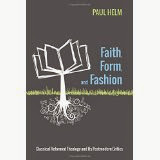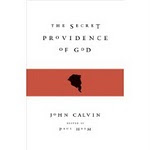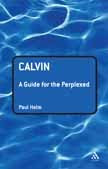Not two views but one
Here I am not going to take sides on the question of which view of
freedom is the preferred one, compatibilism or libertarianism, but to try to show
that whichever it is the Confession is consistent on the question. There are
not two views, but one. William Cunningham had the opinion that subscribers to
the Confession could understand its statements on human agency either in a
necessitarian way, or in a non-necessitarian way, in good faith. (See
‘Calvinism and the Doctrine of Philosophical Necessity’ in The Reformers and the Theology of the Reformation.) He meant, I
think, that the Confession’s statements were not explicit on the question, but
in effect they mumbled when this topic came up, or obfuscated, and so can be taken
either way.
But this is rather different from saying that the Confession teaches two
incompatible views. (We should also bear in mind that the Confession does not
use the terms ‘compatibilist’, ‘libertarian’ or even ‘necessitarian’. Though it
does refer to what God ‘determines’, though sparingly. Not with anything like the
enthusiasm of those who these days blithely talk of ‘theological
determinism’. So caution is needed in this area.) It is certainly true that the
Confession does not develop one view or the other in explicit terms. Crisp makes that point.
Crisp cites some remarks of Jerry Walls. He (Walls) appears to hold that
the statements of the Confession in one place commits it to:
(1) Because a person is determined to do an action by God making him will
to do this, the person is able to do the thing.
This is taken, I assume by Jerry Walls (I haven’t seen his
book), to imply libertarianism and not compatibilism.
The chapter on effectual calling (Chapter 10) is cited as evidence.
Perhaps these words from that chapter:
This effectual call is of God’s free and special grace alone, not from any thing at all foreseen in man; who is altogether passive therein, until, being quickened and renewed by the Holy Spirit, he is thereby enabled to answer this call, and so embrace the grace offered and conveyed in it. (S. II)
And perhaps by other statements found in the Confession. Walls asserts
that the Confesssion is also committed to
(2) A person is enabled to do that thing by God, but it is up to the person
whether he does that action.
and this is taken by Walls to be consistent with libertarianism.
(Though that these words clearly only libertarianism is in my view a bit of a
stretch.)
Perhaps it is thought that this passage from Chapter 10 commits the
Confession to (2):
…renewing their wills, and, by His almighty power, determining them to that which is good, and effectually drawing them to Jesus Christ, yet so, as they come most freely, being made willing by his grace.(S. I)
If so, the divines are envisaged as committing themselves in section (I)
of Chapter X in the space of a few lines, not only to two distinct theories of human freedom, but also both to Augustinianism and to
semi-Pelagianism,. (Perhaps they did not notice the fact, or perhaps it was a matter of policy.) Maybe. But do you think
that was likely?
But apart from the implausibility of one of the interpretations of part
of Chapter X, there is another reason why all this is not likely. To see this,
we must make a more thorough induction of the language of the Confession. We
find that the choice of words to describe human agency is quite interesting.
Here (I think) are all the relevant references:
The Confession on human
liberty and freedom
An attempt will be made to show not that there are two rival metaphysical
views of human freedom side by side in the confession, but that language about
freedom and about liberty is in fact doing two distinct jobs. First let us look
at ‘liberty’ then at ‘freedom’.
Liberty
Decree III.1 ‘neither is the liberty
or contingency of secondary causes…’
Creation IV.2 ‘being left to the liberty
of their own will’
Of Free Will, IX.1 ‘God hath endued the will of man with that
natural liberty….’
Freedom
Of Free Will, IX.2, ‘man in his state of innocency, had freedom and power to will and to do that
which is good….’
IX.4 ‘….he freeth him from his
natural bondage under sin, by his grace alone enables him freely to will and to do that which is spiritually
good…’
IX.5 ‘The will of man is made perfectly and immutably free to do good alone in the state of glory only’
Effectual Calling, X.1 ‘….yet so as they come most freely, being made willing by his grace’.
This survey excludes the wordings in Chapter XX, ‘Of Christian liberty,
and Liberty of Conscience’. But here ‘liberty’ is being used in a political or
social sense as it is in ‘Liberty, Equality and Fraternity’, for example, and
is not relevant to our discussion.
Comments
Otherwise than in the Chapter on Liberty of Conscience, I suggest that in
the Confession, ‘freely’ has invariably to do with spiritual ability, the
enjoyment of the effects of divine grace. So in heaven the saints have perfect
and immutable freedom to do good, and
those who are effectually called are such as they come to Christ most freely, being made willing by his
grace; not metaphysically willing in some respect, but morally willing. And so
on. The opposite of such freedom is not a metaphysical state, because in the
Confession ‘freedom’ does not denote a metaphysical view, but a moral and
spiritual state, often referred to as freedom
(to some degree) from the ‘bondage’ of the will.
So while at first sight we might suppose that ‘freely’ in the occurrence of ‘yet so as they
come most freely, being made willing
by his grace’ refers either to compatibilist
or libertarian freedom, I suggest that the use of ‘free’ and ‘freely’ here has its
source not in metaphysical debates about the will, but in the operations of
divine grace, and in the usage of the New Testament. For example, ‘So If the
Son shall sets your free, you will be free indeed.’ (Jn.836. See also v.21) , and ‘where the spirit of the Lord is there is
freedom’, (2 Cor. 3.17) and ‘the freedom of the glory of the children of God’
(Rom.8.21). Freedom is linked to certain graciously-given states of the people
of God
What about ‘liberty’ in the Confession? When this word is used by the
divines, its use is much more general. The context of its use has to do with
the capacities of human beings in general. `The liberty of second causes’ has to with those individuals endowed
with intelligence and will, by comparison with the behaviour of animals,
insects and vegetation, other kinds of secondary. This is the liberty which God
has endowed us, as men and women. In addition the Confession states that without
divine assistance to keep them on the straight and narrow, the pair in the
Garden were ‘left to the liberty of their own will’, whatever the character of
that willing may have been. It is not that the pair had freedom to choose good
or evil, but they were created good, and therefore biased toward the good; yet
not immutably so, and being left to the liberty of their own wills, that is,
without receiving divine enabling, they lapsed, succumbing to devilish
temptation, and ‘brought death into the world and all our woe’. But in the
glory to come, the Confession states, ‘the will of man is made perfectly and immutably free to do good alone in the
state of glory only.’ Notice again the connection between freedom and a state
of grace.
So….
So what is being suggested is that the choice of words in the Confession
follows a deliberate policy and that
that policy is consistent and intelligible. If this suggestion is plausible,
there is no need to resort to the debate between libertarians and
compatibilists, important though that debate is, or to indulge in to what
Oliver Crisp calls ‘a subtle sleight of hand’ (80), to make out this
intelligibility.









